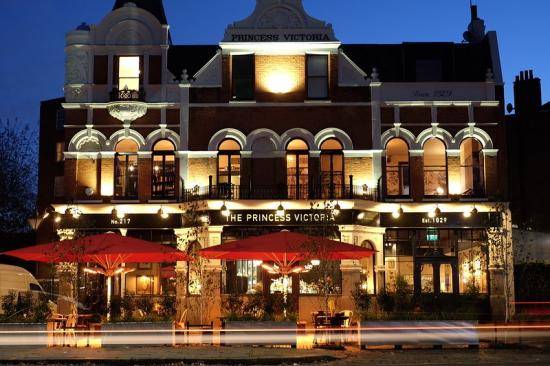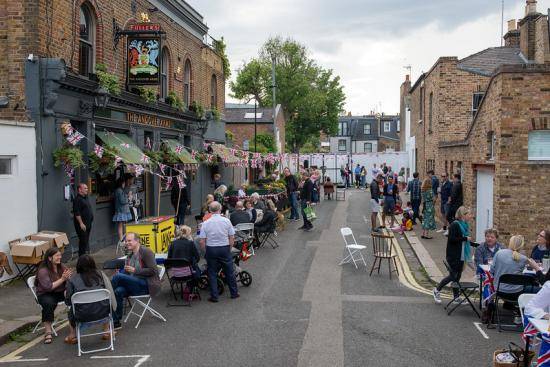Policy E12
Public houses
- The council will only permit the change of use, redevelopment or partial redevelopment of a public house after consideration of relevant Town and Local Centre retail policies and an assessment of the following:
a) a viability report that demonstrates to the council's satisfaction that the public house is no longer economically viable, including evidence of active and appropriate marketing as set out in Appendix 5;
b) the partial change of use including of ancillary areas such as the garden, will not affect the ongoing viability of the pub use;
c) the role the public house plays in the provision of space for community groups to meet and whether the loss of such space would contribute to a shortfall in local provision;
d) the contribution to the borough's culture offer or evening economy;
e) the design, character and heritage value of the public house and the significance of the contribution that it makes to the streetscape and local distinctiveness, and where appropriate historic environment, and the impact the proposal will have on its significance; and
f) the ability and appropriateness of the building and site to accommodate an alternative use or uses without the need for demolition or alterations that may detract from the character and appearance of the building.
- Where the evidence demonstrates to the council's satisfaction that a public house is not economically viable, but where the building is assessed as making a significant contribution to the local townscape and streetscape or is assessed as making a positive contribution to the historic environment, the council will require the building to be retained.
- The proposed change of use of all or part of a ground floor of a public house for residential use will only be acceptable where:
a) the premises are not within a town centre, key local centre or neighbourhood parade;
b) the proposal has been assessed against parts 1c, 1d and 1e of this policy and the impact of the proposal on these features;
c) the council is satisfied that residential use is acceptable, the accommodation to be provided will be of high quality and it meets the residential standards (the nationally described space standard or any subsequent replacement); and
d) the new development can be integrated effectively with existing businesses and community facilities, as set out in the London Plan Agent of Change Policy and provide mitigation before the development has been completed.
- The applicant will be required to carry out an assessment of the needs of the community for community facilities to show that the existing or former public house is no longer needed, and that alternative provision is available in the area.
6.88 The National planning policy ( NPPF 2025) includes pubs as main town centre uses, and identifies their important role in providing the social, recreational and cultural facilities and services the community needs. It expects local plans to plan positively for their provision to enhance the sustainability of communities and residential environments. The NPPF also sets out the importance of using agent of change principles to ensure that new development can be integrated effectively with existing businesses and community facilities (such as places of worship, pubs, music venues and sports clubs). London Plan Policy HC7 supports public houses which can provide a cultural and social focus for a neighbourhood, and seeks to protect them where they have a heritage, economic, social or cultural value to local communities, or where they contribute to wider policy and regeneration objectives for town centres, night-time economy areas, Cultural Quarters and Creative Enterprise Zones.
6.89 Public houses (including bars and other drinking establishments for the purposes of this policy) play an important role and social function in the local community, and they add to the local character of an area and can often be buildings of historical or architectural interest. Some pubs host theatres or live music, and play an important role in town centre diversification. They support the council's Cultural Strategy and the councils Industrial Strategy ambitions for the evening economy and town centres.
6.90 Over recent years the borough, like the rest of London, has seen a number of pubs change to other uses, including retail and residential. Changes to the Use Classes Order mean public houses are now a Sui Generis use where there are no permitted development rights for changes of use.

Pubs of historic or architectural interest
6.91 Hammersmith and Fulham's Pubs of historic or architectural interest and/or cultural or community value will be protected from demolition and/or change of use, in accordance with London Plan Policy.
6.92 The council will resist the loss of public houses as they can fulfil the following important roles:
- a social role in supporting local community interaction and activities to help maintain sustainable neighbourhoods;
- an economic role in contributing to the vibrancy and vitality of shopping and commercial areas, and the vibrancy of residential areas contributing to a mix of land uses;
- a cultural role – theatres supporting evening economy and cultural strategy; and
- an environmental role in their intrinsic value to the cultural and historic heritage of local neighbourhoods.
Loss of public houses
6.93 Development proposals for loss or part loss of a public house, including its operational and ancillary amenity space, will need to be accompanies by robust evidence which would demonstrate that the viability of the pub, and its current and future operation, will not be compromised. Details accompanying a planning application would be expected to show how the character and appearance of the building, including any features of historic or cultural significance have been preserved. A thorough marketing exercise must be carried out as set out in Appendix 5 which takes into account the Campaign for Real Ale's (CAMRA) Public House Viability Test. The council will expect applicants to demonstrate that robust efforts have been made to preserve the facility as a public house, including through evidence of regular maintenance and upkeep, good management and through business diversification.

Community spaces
6.94 The use of pub space for community groups can be a valued resource and evidence will be required demonstrating consultation has taken place with local community and voluntary organisations. Where there is local need, this use should be retained or replaced within the building, unless an alternative approach can be identified and agreed.
6.95 In the protected shopping frontages, the retention of the ground floor for non-residential use will be encouraged to help maintain street activity and a mixed use neighbourhood.
6.96 When nominations are received, the council may also consider adding certain public houses to the Register of Assets of Community Value if the community support for their retention is significant.